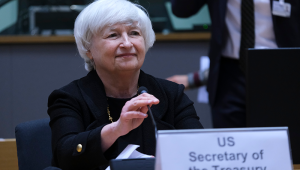Although the government recorded a $160.3bn surplus in April because of rising tax receipts, the deficit so far this year is 37.7% higher than a year ago.
On Friday the US Treasury Department said the deficit for the first seven months of the budget year beginning in October was $530.9bn compared to $385.5bn for the same period last year.
Deficits have risen since Congress passed a $1.5 trillion tax cut promoted by President Donald Trump in December 2017, and have been swelled by spending on domestic and military programmes.
Moreover, April always tends to be a surplus month as revenue floods in when individuals pay tax bills before the official deadline, and this year’s surplus of $160.3bn was actually down on April 2018.
The Treasury Department projects that deficits will reach $1.1trn by the end of the fiscal year in September, well above last year’s deficit of $779bn, although the Congressional Budget Office projects a lower estimate of $896bn.
However, the CBO says federal debt held by the public is projected to grow from 78% of GDP in 2019 to 92% in 2029.
The Trump administration believes the federal deficit will stay above $1trn for four years before starting to decline for the rest of the decade.
By contrast, the CBO argues that without intervention the deficit could increase in nominal terms until 2029 to become larger as a share of GDP than it has been on average over the past 50 years.
Trump’s 2017 Tax Cuts and Jobs Act made sweeping changes to the tax code valued at $1.5trn, cutting corporate tax rates permanently and individual tax rates temporarily.
Critics say it benefits the rich and large corporations disproportionately, and have raised concerns about its potential for fuelling national debt.
While the IMF said the tax reform could provide a short-term boost to the US economy, the Federal Reserve estimated growth in the long-term at levels no higher than before the package was passed, suggesting that it does not foresee any long-term boost.














